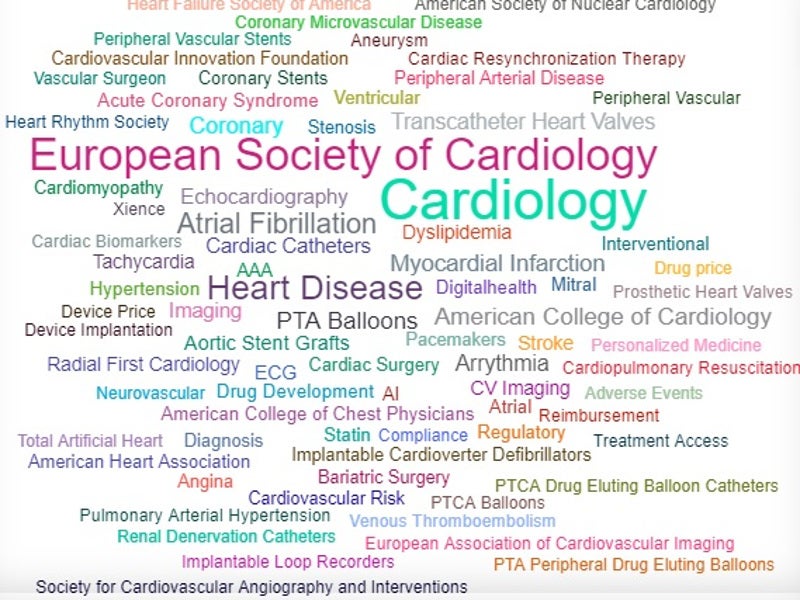
Pharmaceutical Technology lists the top five terms tweeted in cardiovascular in Q3 2019, based on data from GlobalData’s Influencer Platform.
The top tweeted terms are the trending industry discussions happening on Twitter by key individuals (influencers) as tracked by the platform.

Discover B2B Marketing That Performs
Combine business intelligence and editorial excellence to reach engaged professionals across 36 leading media platforms.
1. European Society of Cardiology – 5,098 mentions
The European Society of Cardiology (ESC) is a non-profit professional association based in France. The ESC Congress 2019 held between 31 August 2019 and 04 September 2019 was the most tweeted topic during the quarter.
The ESC Congress is an annual event held by the association. It is aimed at cardiologists, researchers, and healthcare professionals dealing with cardiovascular medicine. This year’s congress focussed on a range of issues. These included clinical manifestations, prevention, and diagnostic methods and management of cardiovascular diseases. The event witnessed participation from 13,050 people.
This is a great example of how giving everyone a voice through social media can be such a powerful tool in spreading knowledge … congratulations #ESCcongress and all of #CardioTwitter https://t.co/Oj2FJmb3Ih
— C. Michael Gibson MD (@CMichaelGibson) September 25, 2019
 GlobalData Strategic Intelligence
GlobalData Strategic IntelligenceUS Tariffs are shifting - will you react or anticipate?
Don’t let policy changes catch you off guard. Stay proactive with real-time data and expert analysis.
By GlobalData
2. Atrial Fibrillation – 2,064 mentions
The triggers of atrial fibrillation (AF) and ways to address complications caused by the condition, were the most popular tweeted. Caffeine, exercise, anger or stress, and lack of sleep were identified as the most common triggers of AF. This is according to new studies by the American Heart Association and European Heart Rhythm Association.
Beta-blockers, anticoagulants, cardiac ablation and other methods can be used to treat AF-associated conditions such as arrhythmia and stroke. However, the same methods may not be applicable for all patients. The suitability of these methods must be assessed based on the patient’s condition and disease history before making a decision.
74% of AF pts report a median of 2 modifiable triggers for their episodes of AF. The most common triggers are alcohol (35%) caffeine (28%) exercise (23%) lack of sleep (21%). Pts reporting triggers have 71% ↓ risk of HF and 2.04 greater OR of a family history of AF #HeartRhythm pic.twitter.com/DEqsZUj0A2
— Raviele Antonio (@drraviele) July 2, 2019
3. Transcatheter Heart Valves – 925 mentions
The US Food and Drug Administration’s approval of transcatheter aortic valve replacement (TAVR) for low-risk patients was one of the key developments discussed. The approval covers the Sapien 3, Sapien 3 Ultra, CoreValve Evolut R, and CoreValve Evolut PRO valves. All of which were approved for use in higher risk open-heart surgery.
An estimated 75% of all aortic valve replacements are anticipated to be done by TAVRs instead of surgical aortic valve replacements (SAVRs). This is a paradigm shift in cardiology. Although TAVRs are less invasive compared to SAVRs, proper care following procedures is essential to success.
It’s truly a historic day in transcatheter medicine! @US_FDA approves #TAVR for low risk indication! This is the culmination of innovation & careful scientific collaboration btwn medicine & industry guided by a vision to offer something better to patients. Exciting new era! @SCAI
— Chandan Devireddy MD (@drdevireddy) August 16, 2019
4. Acute Coronary Syndrome – 350 mentions
The results of the Odyssey Outcomes trial that tested the effect of PCSK9 inhibitor alirocumab in improving cardiovascular events, was trending during the quarter. The trial showed that treatment with alirocumab reduced cardiovascular events in twice the number of patients diagnosed with diabetes as in patients without diabetes. It did not increase the risk of new-onset diabetes.
Alirocumab treatment was also found to be effective in reducing death risk after acute coronary syndrome, provided the treatment was maintained for two to three years.
Effects of alirocumab on cardiovascular and metabolic outcomes after acute coronary syndrome in patients with or without diabetes: a prespecified analysis of the ODYSSEY OUTCOMES randomised controlled trial https://t.co/fyEqqFi6Zp
— Dr. Deepak L. Bhatt (@DLBHATTMD) July 3, 2019
5. Hypertension – 347 mentions
The risk factors leading to hypertension and the importance of screening and testing the condition was widely discussed during the quarter. This is especially important as hypertension itself has no symptoms. Hypertension can lead to heart disease, heart attack or stroke, in high-risk patients such as pregnant women.
Hypertension during midlife further develops the risk of dementia. This requires people over 35 years of age to undergo regular screening to identify high-risk patients.
https://twitter.com/AnastasiaSMihai/statuses/1147726780385517568



